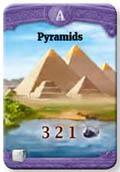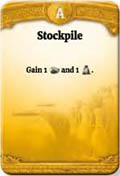
he first round is the simplest, but it lays the foundation for all the others. The game starts in Antiquity, a preparatory round in which players take a few cards from the card row. This defines your civilization's ancient heritage.
Each player takes one turn according to the first-round rules.
Your first turn has only 2 phases:
In the Action Phase, you may take one or more cards from the card row.
During the End-of-Turn Sequence, your civilization produces some food, resources, and science. You end your turn by making all your actions available for the next turn.
Action Phase
In the first round, you have a limited number of actions and limited options for using them.
Available Actions
Each player begins with a different number of white tokens on his or her Despotism card. Each white token on a card represents an available civil action.
The remaining white tokens, as well as both red tokens, are beside the government card. In the first round, these are not available.
For the first round, you have only 1, 2, 3, or 4 civil actions available, depending on your place in the order of play. These may only be used to take cards from the card row.
In later rounds, you begin your turn with all actions available.
Taking Cards
The card row begins with 13 civil cards from Age A. It costs a certain number of civil actions to take a card. The cost is depicted below the card's space in the card row: 1 civil action to take one of the first five cards, 2 for one of the next four, 3 for one of the four rightmost cards.
To take a card from the card row, you must pay the number of civil actions depicted under it.
Paying Civil Actions
To pay civil actions, you take the corresponding number of white tokens off your government card and place them beside your board. These are spent actions. They are no longer available to be used this turn.
The starting player has only one civil action, so he or she can only take one of the 5 cards in the first section of the card row. The second player can take up to 2 cards from that section, or 1 card from the middle section. Players do not have to use all their actions if they do not want to.
Age A Cards
There are 3 types of cards in Antiquity: leaders (green), wonders (purple), and action cards (yellow).
Leaders

A leader is a great historical figure whom you choose to be the spiritual guide of your civilization. The leader's legacy gives you special abilities and benefits. These may be described in the text of the card or depicted symbolically at the bottom.
When you take a leader card, you keep it in your hand. It has no effect until you put it into play. In the first round, you are not allowed to put leaders into play, so keep it in your hand for now. In all rounds, you are subject to the following limitation: you may not take 2 leaders from the same age.
Once you have taken an Age A leader, you may never take another one. This limitation applies regardless of whether the card enters or leaves play. But you are not prevented from taking one of the Age I leaders.
Wonders

Wonders are the most epic constructions in the game. They provide significant benefits, but they take time and resources to build.
Wonders are the only cards that you put directly into play as soon as you take them. You never put a wonder in your hand. When you take a wonder from the card row, place it next to your player board. Turn it sideways to indicate that it is under construction. We call it an unfinished wonder.
You are only allowed to have 1 unfinished wonder in play. You cannot take a new wonder card if you currently have an unfinished wonder.
When you complete the wonder, you will turn it right side up to indicate that it is now completed. At that time, its effects will begin to apply. Completed wonders do not prevent you from taking a new wonder, but they do make it more expensive:
The cost to take a wonder card is increased by 1 civil action for every wonder you already have built.
So the first wonder you take costs the usual amount of civil actions. Once you complete it, taking the next one costs you 1 extra civil action. Taking a third wonder costs 2 extra civil actions, etc.
Tip: Before you take a wonder card, make sure you can build it and make sure you want it. There is no easy way to get rid of an unfinished wonder, and it can keep you from getting a wonder you need more.
Action Cards

An action card represents good fortune or an exceptional effort. Unlike the other civil cards, an action card will not have a permanent effect. It gives you a one-time benefit when you play it, and then it goes to the discard pile. If you take an action card, keep it in your hand. You may play it on a later turn.
Open Civil Cards
All civil cards are taken from the card row and played face up. So each player's civil cards are known to any player who can keep track of that information.
If you do not want to have this memory aspect in the game, you may agree that any player must reveal his or her civil cards on request, or even agree to play with civil cards face up on the table (possibly turned sideways so that it is clear that they are cards in hand and not cards in play). Even if the cards are public, they are still considered to be cards in hand until they are played or discarded.
Example Of Taking Cards
Three players are choosing from these cards:
The starting player has only 1 civil action. He uses it to take the leader Moses into his hand. Then he performs his End-of-Turn Sequence as explained below.
The second player has 2 civil actions. She takes the Colossus and places it sideways on the table to show that it is not finished. She decides to use her second civil action to take the Engineering Genius card, which will allow her to build the Colossus more quickly. That card goes into her hand. She performs her End-of-Turn Sequence.
The third player has 3 civil actions. He would like to spend 2 civil actions to take Hammurabi, but what could he do with his third action? Homer and Aristotle are the only cards available for 1 action, and no player may take more than one Age A leader.
He could take Hammurabi anyway and end his turn with 1 civil action unused. If he prefers to take two cards, he could, for example, take Aristotle into his hand and put the Library of Alexandria into play as an unfinished wonder.
Or he could take one of the cards that costs 3 actions if he saw one he liked more than Hammurabi. In any case, he ends his turn with the End-of-Turn Sequence, and then it is time for round two.
End-of-turn Sequence
Your player board depicts the steps at the end of your turn, but in the first round, only certain steps are relevant.

Discard Excess Military Cards
You have no military cards in round one, so you ignore this step.
Production Phase
There is no risk of an uprising yet, so you will perform the steps of your Production Phase.
Score Science And Culture
Move your science points counter ahead by a number of spaces equal to your science rating. Move your culture points counter ahead by a number of spaces equal to your culture rating.
Because players can do nothing but take cards in the first round, they all end their turns with the same ratings: 1 science and 0 culture. Move your science points counter ahead 1 space. Your culture points counter remains on the 0 space.
Note: Your science rating marker (the round one) does not move. It indicates how many spaces you should move your science points counter (the octagonal one).
Corruption
There is no risk of corruption in the first round. Ignore this step.
Food Production
Now each farm will produce food. For each worker on a farm technology, move a blue token from your blue bank to that card.
You have two Age A farms (two yellow tokens on Agriculture) so you take two blue tokens from your blue bank and put them on your Agriculture card. The symbol at the bottom of the Agriculture card indicates that each blue token on this card is worth 1 food. Congratulations! Your civilization is now storing 2 food.
Food Consumption
Your land is only sparsely populated, so your people do not eat any of the stored food. Ignore this step in round one.
Resource Production
This is analogous to food production: for each worker on a mine technology, move a blue token from your blue bank to that card.
You move two blue tokens to your Bronze card, which means you are storing 2 resources. These can be spent on later turns.
Draw Military Cards
You can draw one military card for each available military action. In round one, you have no available military actions, so you can draw no cards. Ignore this step.
Reset Actions
Put all your white and red tokens on your Despotism card. On your next turn, you will have 4 civil actions and 2 military actions available.

Continue Reading


